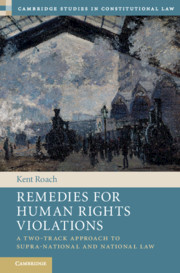Book contents
- Remedies for Human Rights Violations
- Cambridge Studies in Constitutional Law
- Remedies for Human Rights Violations
- Copyright page
- Brief Contents
- Contents
- Acknowledgements
- Table of Cases
- 1 The Importance and Complexity of Remedies
- 2 A Two-Track Approach to Individual and Systemic Remedies
- 3 Interim Remedies
- 4 Remedies for Laws That Violate Human Rights
- 5 Damages
- 6 Remedies in the Criminal Process
- 7 Declarations, Injunctions and the Declaration Plus
- 8 Remedies for Social, Economic and Cultural Rights
- 9 Remedies for Violations of Indigenous Rights
- 10 Conclusion
- Select Bibliography
- Index
9 - Remedies for Violations of Indigenous Rights
Published online by Cambridge University Press: 29 March 2021
- Remedies for Human Rights Violations
- Cambridge Studies in Constitutional Law
- Remedies for Human Rights Violations
- Copyright page
- Brief Contents
- Contents
- Acknowledgements
- Table of Cases
- 1 The Importance and Complexity of Remedies
- 2 A Two-Track Approach to Individual and Systemic Remedies
- 3 Interim Remedies
- 4 Remedies for Laws That Violate Human Rights
- 5 Damages
- 6 Remedies in the Criminal Process
- 7 Declarations, Injunctions and the Declaration Plus
- 8 Remedies for Social, Economic and Cultural Rights
- 9 Remedies for Violations of Indigenous Rights
- 10 Conclusion
- Select Bibliography
- Index
Summary
These remedies involve the challenges of responding to the harms of colonialism and avoiding new neo-colonial harms. Part I stresses the importance of interim remedies to prevent irreparable harm to Indigenous rights. Courts should stop their tendency to discount pecuniary losses even while trying to off-set this with a more generous approach to non-pecuniary harms. Part II examines the duty to consult. It, like the South African practice of engagement, can result in consensual agreements but also authorize limits on rights, especially if no attempt is made to address inequality of bargaining power and respect Indigenous law. Part III argues that proportionality principles can be used to avoid allowing majoritarian and economic interests to weaken remedies. Following Article 40 of the United Nations Declaration on the Rights of Indigenous Peoples, the overall balance stage should be applied bi-jurally to respect both rights and Indigenous law including with respect to the environment. Part IV suggests that domestic and supra-national courts should focus on providing first-track remedies to prevent irreparable harm and compensate for past harm. They should employ a lighter and respectful touch that encourages bi-jural treaties as systemic remedies. Effective first-track remedies may make such agreements more likely.
Keywords
- Type
- Chapter
- Information
- Remedies for Human Rights ViolationsA Two-Track Approach to Supra-national and National Law, pp. 454 - 515Publisher: Cambridge University PressPrint publication year: 2021



